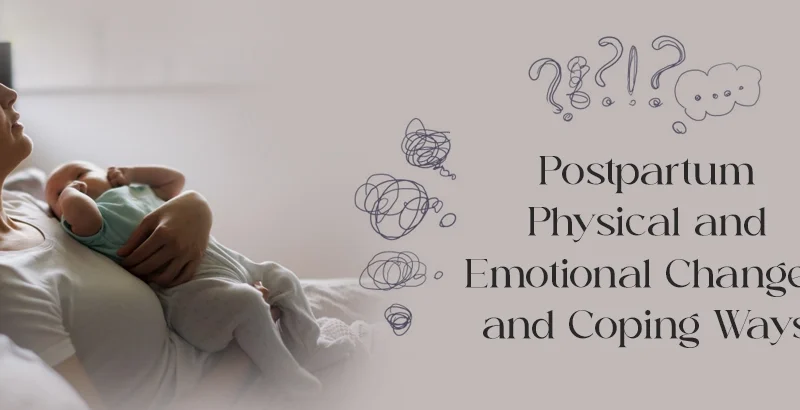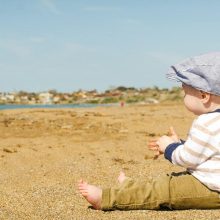Postpartum Physical and Emotional Changes and Coping Ways

Once you’ve delivered your little one, you must have thought you’re free from all the challenges, but that’s far from being true.
The stages after delivery of your baby are also not that hunky-dory.
What to Expect From Your Postpartum Phase?
You have done a remarkable job by giving birth. You may have delivered vaginally or via an emergency c – section, but once you hold your baby in your arms, you’ll feel both your body as well as mind have gone against you.
By the time you recover, here are a few challenges from the first stage of your postpartum to the last.
While you’re just focusing on your newborn, the initial physical and emotional adjustment may be a little difficult.
- Thanks to your declining hormones you are going to be surprised with exertion, vaginal bleeding, postpartum haemorrhage, eclampsia, urination incontinence, etc.
- You want to get back in shape. But that won’t happen so soon. You may lose around 10 pounds right after childbirth. But you’d require beyond the first month, to lose the weight you’ve gained during your pregnancy.
- Even your belly or baby bump won’t go back in shape so soon. You’ll still look pregnant.
- But, if you’re feeling blue, weepy, or elated; that’s perfectly fine and natural.
By the Time You’ve reached the 2nd to 6th or 8th Week of Postpartum
(A little more than one month), you’ll feel much better. The challenges of the first phase of your postpartum may not be a thing of the past entirely, but the changes are taking place slowly. After all, the hormones are taking their own sweet time to adjust to your body and mind. So, the challenges that you’re going to come across at this phase of your postpartum are:
- The vaginal and perineum healing will take more than the expected time. But the bleeding and pain is lighter and a lot better now.
- Swollen breasts as well as sore nipples as a result of continuous breastfeeding may turn out to be uncomfortable for you.
- Night sweats or hot flashes during this time are your body’s need to flush out the postpartum fluids.
- You can expect your moodiness to disappear after two weeks. But if you see you’re struggling with your emotions even after the 2nd week, consult your healthcare provider.
- If your childbirth is caesarean, the incision (cut) sites may be numb, itchy, or sometimes even painful.
- In the first three months of your postpartum and beyond that, you’ll notice certain changes in your hair. (The pregnancy hormones made your hair thick). At this stage, You’ll find that your hair has thinned out. Hair fall will also not be uncommon. Expect your hair fall to stop within 6 months of your childbirth. But, you can regain your hair within a year.
- During the nine months of your pregnancy, you’ve worn the stretch marks around your belly, and near your thighs, hips, and bottom as a batch of pride. But, after childbirth, there will be itchy marks left on your skin. These marks do not fade away immediately. With medical help as well as natural remedies they fade away over time.
How Do You Cope With Your Postpartum Changes?
The period of postpartum is the time of restoring the muscles as well as connective tissue. But the recovery stage wouldn’t be easy. Your body will take around 3 to 6 months to adjust and recover completely.
To see your overall health recovering, visiting the doctor is the norm. The healthcare provider will surely advise you on the medical remedies. At the same time, you’d need to enter a natural routine to heal your body and mind.
How to Treat Perineum Soreness?
Since childbirth involves stretches and tears in the perineum area (the area between the rectum and vagina), practising Kegel exercises can help a lot.
- Doing the Kegels thrice daily for at least 10 seconds can prevent you from passing urine.
- Wrap ice in a towel and put the cold pack on the perineum. The pain will gradually start reducing.
- Take a relaxing warm bath.
- To prevent yourself from any kind of infection in the area, practice wiping front to back after using the bathroom.
- Sit on a pillow or a doughnut-shaped cushion.
How to Treat Uterine Cramps?
The uterus(womb) has worked very hard in carrying your precious little one. After the delivery of your baby, you’ll feel uterine pain, while it is trying to go back to its pre-pregnancy size. You need to go to the healthcare practitioner, to help you with over-the-counter medicines.
How to Treat Vaginal Discharge?
With the baby’s birth, your body will release heavy, as well as bright red colour blood with clots in the first few days. With time, the bleeding will be lighter. Sanitary napkins will be your saviour during this time. Wearing sanitary pads till such time that the bleeding stops would be helpful.
How to Treat Breast Engorgement as well as Assured or Aching Nipples?
The breasts may feel full of milk and swollen. Here’s how to deal with breast engorgement and nipple soreness or pain naturally:
- Try to breastfeed regularly as well as for a longer period to feel better. In addition to this, try not to skip the night feeds.
- Try to take a warm bath and help the milk flow.
- Applying cold packs on the breasts can help.
- Wear supportive inners when you’re not feeding your little one.
- Besides this, you’ll feel nipple pain when your baby is not latching correctly. Massage some breast milk on the nipple to reduce the pain. However, after feeding the baby, let the nipples air-dry.
- Change your baby’s position while feeding. Alternatively, feed from both the breasts.
- Make sure that your little one’s mouth has the whole areola (the dark area around the nipple) in, while the baby is latching.
- To further ease breast engorgement and nipple pain you can take medical advice for applying ointment or lotion on the breasts.
How to Deal With Swelling?
Post-pregnancy swelling seen on the hands, face, and legs is due to extra fluid in the body. The fluid retention took place since your pregnancy days. So, it would take some time for the swelling to fade away naturally. You’d still have to put in some extra effort to deal with postpartum swelling. Here’s what you can do about it:
- Try to lie on your left-hand side
- Keep your feet elevated
- Wear loose and comfy clothes
- Stay hydrated
How to Deal With Haemorrhoids?
Haemorrhoids or piles are a result of constipation, developing foetus, and increasing blood volume during pregnancy. But, even after the delivery of your baby, you’ll not find the discomforting piles leaving you. So, what can you do about it?
- Take a bath in warm water
- Of course, you’re having a nutritious and balanced diet. Additionally, include food with high fibre as part of your daily postpartum routine
- Try not to strain on the rectum
- Stay hydrated
How to Deal With Postpartum Urinary Problems?
You may feel the urge to go to the bathroom repeatedly in the first few days after childbirth. This is something also known as urinary incontinence, which comes along with a feeling of pain and burn. So, how can you deal with postpartum urinary incontinence?
- Stay hydrated
- Go for a sitz bath
- Perform Kegel exercises to strengthen the pelvic muscles
- There may be times when you don’t have the urge to pee. Encourage urination by running the tap.
How to Deal With a Post-Baby Bump?
While it will take some time for you to get the belly that you had before your pregnancy, focus on your fitness levels. Certain gentle exercises such as brisk walking, knee touching, and leg extensions can help you stay fit. Take it slowly. Breastfeeding your baby also helps in reducing your weight. Have healthy food.
How to Deal With Your Hot Flashes and Night Sweats?
Take a towel while you’re going to bed, and sleep on it. The towel will soak your sweat. Wear loose and comfortable clothes.
How to Deal With Your Postpartum Fatigue?
Continuous feeding sessions and adjusting your life taking care of your precious one, can leave you exhausted. How to deal with this?
- Take power naps. Especially, when your baby is sleeping
- Fuel your body with healthy (protein and iron-rich) food
- Try to involve yourself in only those household chores which are doable. Don’t get worried if your house looks messy. You needn’t overdo it, and get tired.
How to Deal With Your Stress and Postpartum Depression?
Feeling overwhelmed at this point is quite natural. It may not last for more than 2 weeks, but you can do a lot to help yourself.
- Take rest as and when you can.
- Join support groups, when new mummies are suffering from similar kinds of problems just like you.
- Give some time to yourself. Maybe you could hit the spa or do something that you like the most.
- Going back to work would not be easy at this moment, but you can start working from your house.
Postpartum is an adjustment of life. Take it easy and enjoy it thoroughly.


